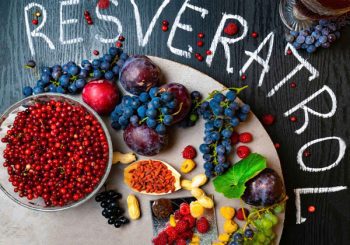Contributing writer for Wake Up World
Until a few years ago, research had pointed to resveratrol’s neuroprotective effects against Alzheimer’s, but not against other types of dementia. However, a Chinese study with rats in 2013 found that resveratrol may also lower the risk for vascular dementia.1
Other studies since then not only support this research,2 but show that resveratrol also activates autophagy and inhibits neuronal apoptosis, and works to improve cognitive function.3 Even more promising, a human study just published in March 20204 showed that “regular consumption of resveratrol can enhance cognitive and cerebrovascular functions in postmenopausal women, with the potential to slow cognitive decline due to ageing and menopause.”
Resveratrol is a natural phytoestrogen and antioxidant probably best known for its benefits in red wine and grapes, and may help protect your brain from neurological diseases such as Alzheimer’s, Parkinson’s and Huntington’s, while also minimizing their damage.5
In the featured studies, resveratrol improved learning and memory in rats and humans with vascular dementia by reducing oxidative stress in their brains. This form of dementia is the second most common type of dementia after Alzheimer’s.6
Vascular dementia is caused by conditions that block or reduce cerebral blood flow, resulting in your brain cells being chronically deprived of oxygen and vital nutrients. Inadequate blood flow can damage and eventually kill cells anywhere in your body, and your brain is particularly vulnerable as it has one of the richest blood supplies.
When the blood vessels in your brain become obstructed, you can experience repeated “mini-strokes,” which result in cumulative tissue damage. This leads to cognitive impairments that typically worsen over time.
According to the Alzheimer’s Association, “A growing number of experts prefer the term ‘vascular cognitive impairment’ (VCI) to ‘vascular dementia,’ because they feel it better expresses the concept that vascular thinking changes can range from mild to severe.”7
Resveratrol: A Powerhouse of Health Benefits
Resveratrol does much more than just protect your brain — it offers benefits for practically every system in your body. It has antioxidant, anti-inflammatory, and anticarcinogenic properties that are well established by science. The compound is produced by plants to increase their survival and resistance to disease during times of stress, such as excessive ultraviolet light, infections and climate changes.
When you consume these plants, they pass on these protections to you. Resveratrol is present in a number of plant foods, including but not limited to the following:
- Red grapes, especially Muscadine (concentrated in the skins and seeds) and red wine
- Pomegranates
- Berries such as black raspberries, mulberries, cranberries and blueberries
- Peanuts
- Cacao/cocoa and dark chocolate
As of March 25, 2020, the National Institutes of Health’s PubMed8 lists 621 articles showing the benefits of resveratrol. In addition to being neuroprotective, resveratrol can reverse oxidative stress, reduce inflammation, normalize your lipids, protect your heart, stabilize your insulin and fight several types of cancer, along with a host of other health benefits.9
Resveratrol is also unique in that it can make some cancers more vulnerable to chemotherapy and radiotherapy.10,11 Many tumors develop resistance to chemotherapy drugs, known as chemoresistance. Researchers are always on the lookout for effective “chemosensitizers” that can help overcome such resistance, and resveratrol has been shown to have that capability with certain chemicals and radiotherapy.
Resveratrol Improves Blood Flow to Your Brain
One of the special properties of resveratrol is its ability to cross your blood-brain barrier, which allows it to moderate inflammation in your central nervous system. This is significant because CNS inflammation plays an important role in the development of neurodegenerative diseases.
In a 2010 study,12 resveratrol was found to suppress inflammatory effects in certain brain cells (microglia and astrocytes) by inhibiting different proinflammatory cytokines and key signaling molecules. In a later study, scientists confirmed that the anti-inflammatory properties of resveratrol have neuroprotective effects.13
There is also solid scientific data that resveratrol helps clear out the plaque in your brain that leads to Alzheimer’s disease. A study published in the Journal of Biological Chemistry14 found resveratrol to exert “potent anti-amyloidogenic activity.”
However, unlike Alzheimer’s, vascular dementia is not a product of plaque formation, but instead results from impaired blood flow. As it turns out, resveratrol has also been shown to improve cerebral blood flow. A study in 2010 found that even one single dose of resveratrol can improve blood flow to your brain,15 which has obvious implications for vascular dementia and stroke. In a 2017 study, scientists said:16
” … resveratrol suppresses vascular smooth muscle cell proliferation, promotes autophagy, and has been investigated in the context of vascular senescence. Pre-clinical models unambiguously demonstrated numerous vasculoprotective effects of resveratrol. In clinical trials, resveratrol moderately diminished systolic blood pressure in hypertensive patients, as well as blood glucose in patients with diabetes mellitus.”
Its benefits may also be related to its ability to activate a particular gene, causing beneficial epigenetic effects.17
Flipping Your Genetic Survival Switch
In 2013 researchers discovered that resveratrol may have antiaging benefits due to its ability to “mimic the beneficial effects of chronic and moderate calorie restriction.”18 A 2017 demonstrated that resveratrol alleviates cardiac dysfunction by flipping on a gene that stimulates production of a protein called SIRT1, preventing disease by recharging your mitochondria.19
Interestingly, calorie restriction and resveratrol exert the same effect on the SIRT1 protein. People who intentionally keep themselves hungry by restricting their caloric intake or, preferably through fasting, seem to be flipping a “genetic survival switch.”
In fact, calorie-restricted mice live longer and are healthier than nonrestricted mice,20,21 showing lower rates of age-related diseases like heart disease, diabetes, obesity, arthritis and cognitive impairment.
A hungry life seems to lead to a longer life, for mice and for humans — at least that’s the direction science seems to be pointing. Moreover, new research is showing that a ketogenic diet also extends longevity and good health22 — which is good news if you practice KetoFasting, where you practice a cyclical ketogenic diet and partial fasting.
Could an Antiaging ‘Wonder Drug’ Be Possible?
The potential to capitalize on an antiaging drug is incredibly seductive to Big Pharma. After all, a “wonder drug” promising to add additional healthy years to your life would be a big seller. Not surprisingly, SIRT1 genetic studies done at Harvard led to the formation of Sirtris Pharmaceuticals, whose primary function was to turn resveratrol into a patentable drug. In 2008, Sirtris was purchased by drug behemoth GlaxoSmithKline for $720 million.23
But, as Harvard Health reported a few years later, hopes for such a wonder drug longevity pill fell flat when patients in the clinical trial reported kidney damage.24 One problem was that the bioavailability of it in humans isn’t all that great — “Most of it exits via your bladder,” The New Republic explained.25 On top of that, even though several clinical trials were ongoing during that time, they were dropped one by one as “unexpected side effects” popped up.
In late 2019, one of those Harvard researchers, David Sinclair, reported that he’s still searching for a resveratrol-based wonder drug.26 But buyers beware: Whenever you give your body a synthetic version of a natural agent, or an isolated agent, you rarely get good results, and you should expect the unexpected in terms of detrimental effects.
It’s always better to consume food the way nature prepared it, with its full complement of naturally occurring, synergistic phytonutrients. Boosting your resveratrol intake would be better accomplished by consuming whole foods rich in that compound, such as grapes, berries and minimally processed raw cacao. If you choose to take a supplement, make sure it contains the whole food form.
And, Sinclair himself admits that, for now, that’s the way he lives. He exercises, practices calorie restriction, avoids carbs and sugar and indulges in sauna bathing, he told Boston Wellness. He also takes vitamin D and vitamin K2 regularly.
So, remember, there is no “magic bullet” for living longer and healthier — it requires a multipronged approach. Wise lifestyle choices can’t be replaced by a pill, although the drug industry never tires of making that promise.
Too Much of a Good Thing
Even overdoing natural supplements can backfire, such as taking excessive amounts of antioxidants. Your body needs some degree of oxidative stress for optimal function and adaptation. Vigorous exercise, for example, creates a high degree of oxidative stress, but without it, your body would not become stronger.
In other words, if the stress on your body were to be removed from exercise, so would the benefit. This is precisely what the University of Copenhagen27 discovered in a study involving older men taking resveratrol. According to Science Daily, researchers said:28
“We found that exercise training was highly effective in improving cardiovascular health parameters, but resveratrol supplementation attenuated the positive effects of training on several parameters including blood pressure, plasma lipid concentrations and maximal oxygen uptake.”
This finding took researchers by surprise. They noted that the quantities of resveratrol given to the men in this study (250mg) were much higher than what they would have received from natural foods.
The take-away message is that antioxidants are not a fix for everything; it’s more about finding balance. Focusing on a healthy diet that optimizes your insulin levels and minimizes inflammation will reduce your risk for all types of dementia, as well as heart disease, diabetes, and other chronic degenerative conditions, as they all share the same underlying causes.
The best approach to antioxidants is to consume a wide variety instead of large amounts of just one. These elements work together synergistically, all performing different roles in your body, similar to an orchestra performing a symphony: The music falls short if only one or two instruments are playing.
Tips for Protecting Your Brain
Resveratrol can be a powerful addition to your diet, but not without a solid nutritional foundation. The first step is making sure you’re covering the basics, which is why I offer my complete nutrition plan. This comprehensive guide addresses the factors underlying all chronic degenerative diseases, including heart disease, cancer, diabetes, obesity and all types of dementia — including vascular dementia.
This plan is available to you, completely free of charge. For additional guidance about how to modify your diet for brain health, refer to my article and interview with neurologist Dr. David Perlmutter. Be sure you specifically address the following:
| Avoid gluten and casein (primarily wheat and pasteurized dairy, but not dairy fat, such as butter) |
| Increase consumption of healthful fats, such as organic butter from raw milk, clarified butter called organic grass fed raw butter, olives, organic virgin olive oil and coconut oil, nuts like pecans and macadamia, free-range eggs, wild Alaskan salmon, and avocado |
| Keep your fasting insulin levels below 3 (following the nutrition plan will help you do this); if your fasting insulin level is above three, consider limiting or eliminating your intake of grains and sugars until you optimize your insulin level |
| Exercise regularly, including high-intensity interval training like the Peak Fitness Technique |
| Optimize your vitamin D levels with safe sun exposure |
| Optimize your gut flora by regularly consuming fermented foods or taking a high quality probiotics supplement |
| Consume enough high-quality animal-based omega-3 fats, such as krill oil |
| Try intermittent fasting |
Intrigued by Calorie Restriction? Try Intermittent Fasting
Contrary to popular belief, the ideal fuel for your brain is not glucose but ketones, chemicals that your body mobilizes when you stop feeding it carbs and introduce coconut oil and other sources of healthy fats into your diet. A one-day fast can help your body to “reset” itself, and start to burn fat instead of sugar.
While the research supporting calorie restriction is compelling, it’s not a very popular dietary strategy for most people, because many simply are not willing to deprive themselves of calories to the extent needed to achieve the therapeutic effects.
An alternative approach that is easier to implement is intermittent fasting, which can be as simple as restricting your daily eating to a narrower window of time, say six to eight hours (this equates to 16 to18 hours’ worth of fasting each and every day).
Recent research suggests that sudden and intermittent calorie restriction appears to provide many of the same health benefits as constant calorie restriction, including extending lifespan and protecting against disease.
Unless you have a serious illness, I believe it’s best for most people to implement intermittent fasting slowly, over the course of six to eight weeks. You begin by not eating for three hours before bed, and then gradually extend the time you eat breakfast until you have skipped breakfast entirely and your first meal of the day is at lunchtime.
And, as I mentioned earlier, you can also incorporate my KetoFasting plan for a healthy approach to calorie restriction.
Be sure that you are only consuming non-starchy vegetables for carbs, low to moderate protein and plenty of high-quality fats. Most people would benefit from upward of 50% to 70% of their daily calories in the form of fats.
One of the things I’ve noticed is that once you’ve shifted your metabolic engine from carb-burning to fat-burning, your desire for sugar and junk food will gradually or rapidly disappear. It typically takes a few weeks for this to occur, but once it does, you’ll be easily able to fast for 18 hours without feeling hungry.
References:
- 1 Neural Regen Res. 2013 Aug 5; 8(22): 2050–2059
- 2 Physiology & Behavior Volume 201, 15 March 2019, Pages 198-207
- 3 Frontiers in Neuroscience August 20, 2019
- 4 Nutrients 2020, 12(3), 828
- 5 Biofactors. 2018 Jan;44(1):83-90. doi: 10.1002/biof.1396. Epub 2017 Nov 23
- 6 Johns Hopkins Medicine
- 7 Alzheimer’s Association
- 8 PubMed March 25, 2020
- 9 National Institutes of Health March 25, 2013
- 10 Annals of the New York Academy of Sciences Volume 1215, Issue 1, January 2011
- 11 Front Pharmacol. 2018; 9: 1534
- 12 Journal of Neuroinflammation August 2010
- 13 Oxid Med Cell Longev. 2018; 2018: 8152373
- 14 Journal of Biological Chemistry September 2005
- 15 Am J Clin Nutr June 2010
- 16 Int J Mol Sci. 2019 Apr; 20(7): 1523
- 17 Biochemistry. 2013 Jul 30; 52(30): 5075–5083
- 18 Annals of the New York Academy of Sciences July 2013
- 19 Oxidative Medicine and Cellular Longevity 2017
- 20 Cell Metab. Author manuscript; available in PMC 2020 Jan 8
- 21 Cell Metabolism January 8, 2019
- 22 Cell Metabolism September 5, 2017
- 23 FierceBiotech April 23, 2008
- 24 Harvard Health Publishing February 3, 2012
- 25 The New Republic March 21, 2013
- 26 Boston Wellness October 29, 2019
- 27 Journal of Physiology Volume 591, Issue 20 October 2013
- 28 Science Daily July 22, 2013
Originally published at mercola.com and reproduced here with permission.
Recommended articles by Dr. Joseph Mercola:
- High Blood Pressure Linked to Increased Risk of Dementia
- Cholesterol Does Not Cause Heart Disease
- CBD Has Unique Ability to Cross Blood-Brain Barrier
- Water and Homeopathy: Latest Discoveries at Science’s Cutting Edge
- Sugar Substitutes: What’s Safe and What’s Not
- Unveiling the Depths of the Human Psyche: Psychedelics May Unlock Parts of the Mind That Are Normally Inaccessible
- What Should Your Poop Look Like?
- The Endocannabinoid System and the Important Role it Plays in Human Health
- Magic Mushrooms May Hold Key to Long-Term Relief from Anxiety and Depression
- Scientific Links Between Processed Foods and Depression
About the author:
Born and raised in the inner city of Chicago, IL, Dr. Joseph Mercola is an osteopathic physician trained in both traditional and natural medicine. Board-certified in family medicine, Dr. Mercola served as the chairman of the family medicine department at St. Alexius Medical Center for five years, and in 2012 was granted fellowship status by the American College of Nutrition (ACN).
While in practice in the late 80s, Dr. Mercola realized the drugs he was prescribing to chronically ill patients were not working. By the early 90s, he began exploring the world of natural medicine, and soon changed the way he practiced medicine.
In 1997 Dr. Mercola founded Mercola.com, which is now routinely among the top 10 health sites on the internet. His passion is to transform the traditional medical paradigm in the United States. “The existing medical establishment is responsible for killing and permanently injuring millions of Americans… You want practical health solutions without the hype, and that’s what I offer.”
Visit Mercola.com for more information, or read Dr. Mercola’s full bio and resumé here.

If you've found value in our articles, we invite you to support the release of our brand-new book, "Gratitude Practices for Kids: A Practical Guide for Adults to Instill a Spirit of Appreciation and Positivity in the Next Generation."
"Gratitude Practices for Kids" brings together over 25 innovative and accessible practices designed to enhance gratitude in everyday life. This comprehensive guide is backed by 17 scientific studies, ensuring each concept is grounded in research, underscoring our commitment to nurturing growth, emotional intelligence, and positive interactions between adults and children.
We encourage you to opt for the paperback version to celebrate this new release. Dive into its fresh pages away from digital distractions, allowing you to immerse yourself in the transformative practices it offers.
Over recent years, Wake Up World has faced significant online censorship, which has impacted our financial ability to operate. Moving into book publishing represents a strategic step to secure the ongoing funds needed to continue our mission. By purchasing Gratitude for Kids, you help us keep our content free and accessible to everyone, avoiding needing a paywall. With over 8,500 articles published in the last 13 years, we remain dedicated to keeping our valuable content open to all.









